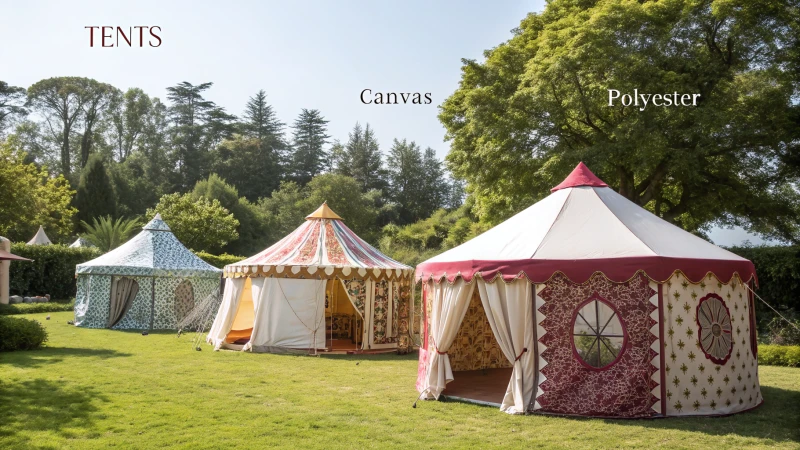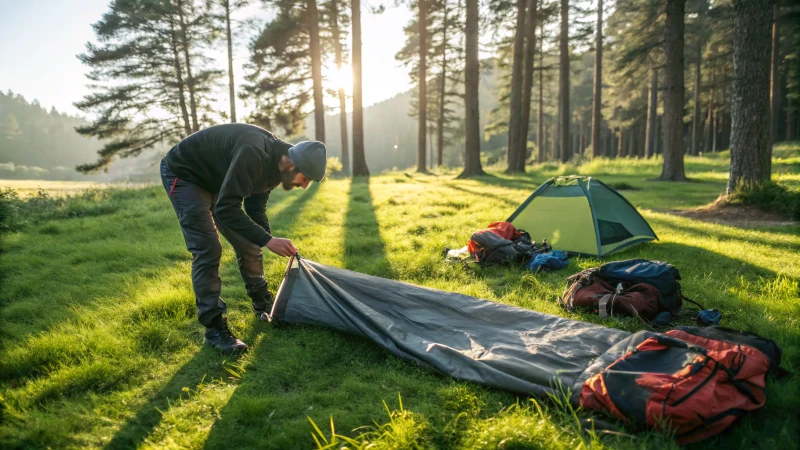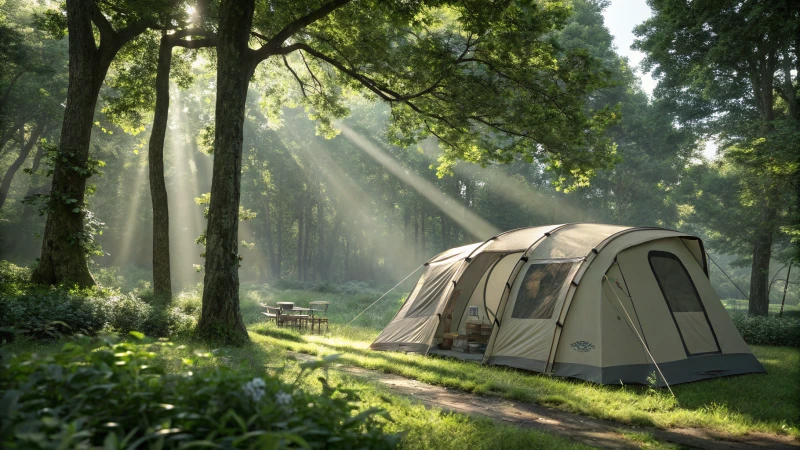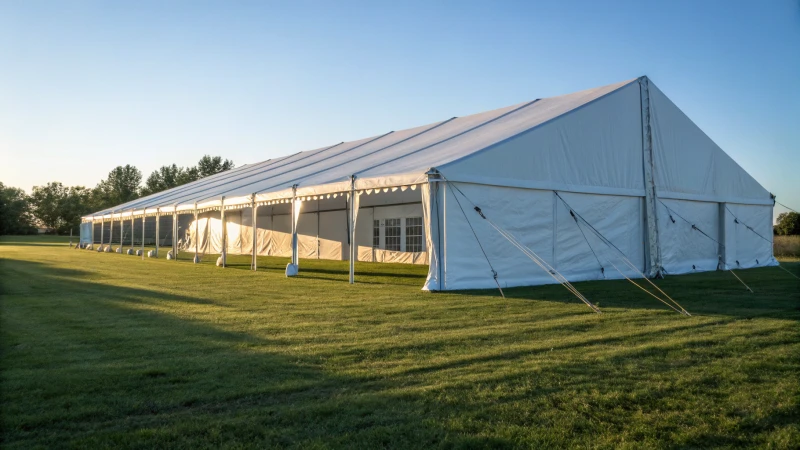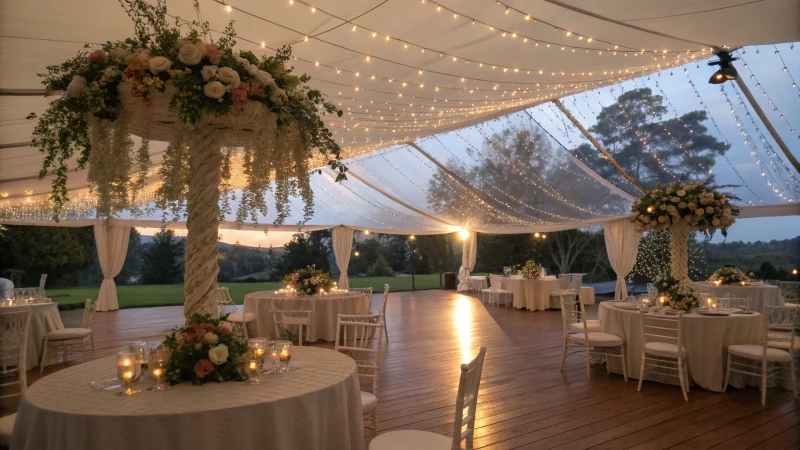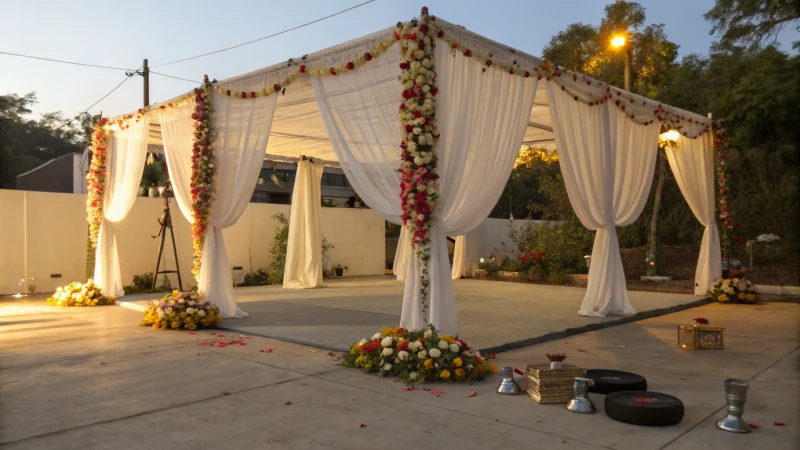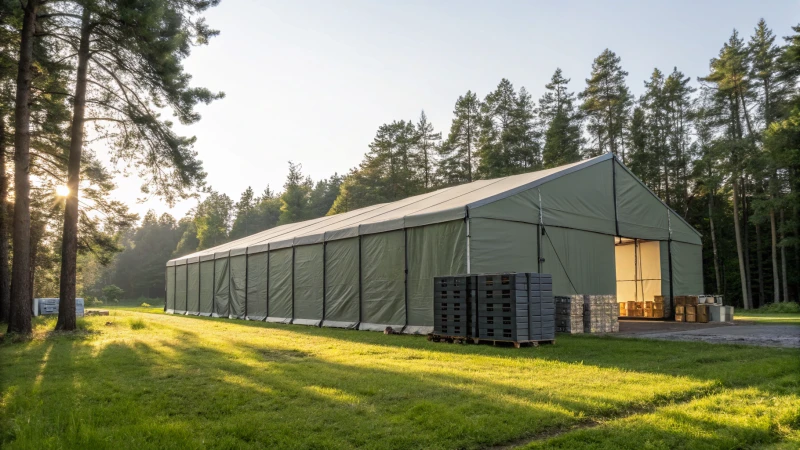
Ever wondered how long a warehouse tent can really last?
A well-constructed warehouse tent can last between 10 to 20 years, depending on the quality of materials, environmental conditions, and maintenance practices. Investing in high-quality frames and fabrics, along with regular maintenance, is key to ensuring your tent’s longevity.
Let me tell you, understanding the average lifespan of a warehouse tent is just the start. It’s like when I bought my first car, thinking I’d keep it forever—but knowing deep down that regular maintenance was the secret to prolonging its life. Similarly, with a warehouse tent, it’s not just about setting it up and forgetting it.
Consider the materials: aluminum frames might be lightweight but are incredibly resistant to corrosion, while galvanized steel frames offer durability that can withstand the test of time, often over 20 years if cared for properly. Then there’s the fabric—choosing a high-quality PVC-coated polyester can be a game changer, lasting up to 10 years with the right upkeep.
But remember, your tent’s environment plays a crucial role too. I once set up a tent near a coastal area, and boy did I learn about the effects of salt! Harsh weather conditions like snow or high humidity can reduce a tent’s lifespan, much like how my bike rusted away after being left in the rain one too many times.
So, if you’re keen on making your tent last, think of it like caring for a prized possession—regular inspections and timely repairs are essential. Just like I check my car for any signs of wear and tear before a long road trip, inspecting your tent for loose fittings or minor tears can save you from bigger issues down the road.
Ultimately, investing time in understanding these factors can significantly extend your warehouse tent’s life, making it not only a smart purchase but also a reliable partner for your storage needs.
Warehouse tents last up to 20 years with good maintenance.True
Proper maintenance and quality materials can extend a tent's lifespan.
Environmental conditions have no impact on tent longevity.False
Weather and climate significantly affect the durability of tents.
What Factors Determine the Longevity of Warehouse Tents?
Ever wondered what makes a warehouse tent truly last? Let’s uncover the secrets of longevity hidden in the materials used.
The lifespan of warehouse tents hinges on the frame and fabric materials used. Durable choices like aluminum or galvanized steel frames, coupled with PVC-coated polyester fabric, significantly enhance longevity by withstanding environmental stresses.

I remember the first time I stood inside a massive warehouse tent. It was during a storm, and as the rain pounded against the fabric, I couldn’t help but marvel at its resilience. That experience taught me the critical role materials play in these structures.
Frame Materials: Strength and Durability
Think of the frame as the skeleton of your tent. It’s what keeps everything standing tall and firm. In my own ventures, I’ve found aluminum and galvanized steel to be game-changers.
-
Aluminum Frames: These are like the marathon runners of tent frames—lightweight1 yet incredibly tough. They’re perfect if you need to move your tent around often, lasting up to 20 years without giving in to rust.
-
Galvanized Steel Frames: These are for those times when you need something unyielding, like a fortress. Heavier and more durable, they can serve you well for over two decades if treated right.
Fabric Quality: The Protective Layer
The fabric is your tent’s armor against the elements. Over time, I’ve come to favor PVC-coated polyester because it stands strong against the wear and tear of weather.
- PVC-Coated Polyester: This material is like a superhero cape, shielding your tent from sun, rain, and fire. It usually lasts between 5–10 years but can be replaced when worn out. Opt for fabrics with UV-resistant2 coatings to extend longevity.
Environmental Conditions: The External Factors
Mother Nature can be unpredictable, can’t she? I’ve learned that where you set up your tent can make or break its lifespan.
-
Weather Exposure: From scorching summers to snowy winters, every season has its challenges. Regularly facing these extremes can wear down even the best materials.
-
Location Impact: Coastal areas with high salt content or industrial zones laden with chemicals can accelerate corrosion, especially in steel frames. Choosing the right materials helps navigate these challenges.
Maintenance Practices: The Care Routine
Taking care of a tent is like caring for a classic car; regular attention makes all the difference.
-
Regular Cleaning: Keeping your tent clean from dirt and mold is not just about appearances—it’s about extending its life by removing pollutants regularly.
-
Routine Inspections: Checking for tears and rust might seem tedious but catching these early saves a lot of trouble down the line.
-
Timely Repairs: Little issues grow into big problems if ignored. Fix them quickly to avoid costly repairs later. Keeping spare parts on hand is advisable.
-
Proper Storage: When it’s time to pack up, storing your tent properly ensures it’s ready for action whenever you need it again by avoiding moisture damage or pest infestations.
| Maintenance Checklist | Frequency |
|---|---|
| Clean Fabric | Monthly |
| Inspect Frames | Quarterly |
| Repair Damages | As Needed |
| Storage Check | Before Storing |
in my experience understanding these factors allows us not just use tents but truly maximize their potential making informed choices taking proactive steps ensure our investment stands test time.
Aluminum frames last longer than galvanized steel.False
Galvanized steel frames are heavier and more durable, lasting longer.
PVC-coated polyester is weather-resistant.True
PVC-coated polyester fabric is known for its durability and weather resistance.
How Do Environmental Conditions Impact the Durability of Warehouse Tents?
Imagine setting up a warehouse tent and feeling confident it’ll withstand whatever Mother Nature throws its way.
Environmental factors like weather, location, and how often you use your warehouse tent can significantly impact its durability. Harsh conditions like strong winds or corrosive environments demand careful material choices and diligent maintenance to ensure your tent stands the test of time.
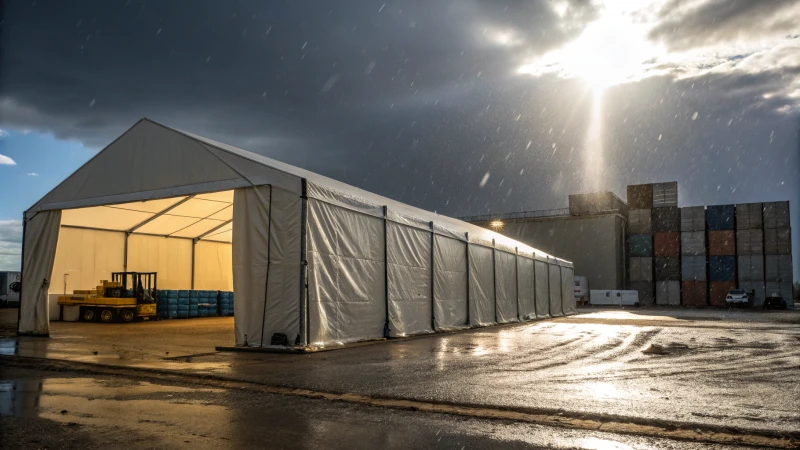
Weather Exposure and Its Effects
Picture this: I once had to deal with a warehouse tent in the middle of winter. We faced relentless heavy snow and fierce winds that seemed determined to topple everything in their path. Let me tell you, these elements can really test the mettle of a tent. Heavy snow accumulates, adding stress to the structure, while strong winds whip and pull at the seams. And then there’s the sun. Those seemingly harmless UV rays3 can sneakily degrade the fabric over time, especially in sunnier climates. That’s why investing in UV-resistant coatings is a smart move.
The Impact of Location
Location, location, location! It’s not just a mantra for real estate but also for ensuring the longevity of your tent. Coastal areas, with their salty breezes, can be particularly harsh on steel frames, accelerating corrosion. I remember once setting up near an industrial area4; the chemical exposure was a real concern. Opting for aluminum frames in such settings can mitigate these effects as they’re less prone to corrosion—a lifesaver.
Frequency of Use
Ever set up a tent only to take it down again, and again? It’s like putting together an IKEA wardrobe on repeat! Frequent assembly and disassembly can wear out components quicker than you’d expect. For temporary setups, investing in high-quality connectors and joints is crucial to withstand repeated use. Regular inspections5 help catch issues early—trust me, you don’t want to find out too late!
Maintenance Practices
Think of maintenance as giving your tent a spa day. Routine cleaning helps keep it looking fresh by removing dirt and pollutants that degrade the fabric over time. Inspections for tears or rust allow for timely repairs—because a stitch in time saves nine, right? Additionally, proper storage6 when not in use is like tucking your tent into bed, safe from environmental damage.
Material Selection
Choosing the right materials feels a bit like matchmaking for your tent’s future happiness. High-quality PVC-coated polyester with flame-retardant properties can offer longer durability.
| Material | Benefits | Considerations |
|---|---|---|
| Aluminum Frames | Lightweight, corrosion-resistant | Less robust than steel |
| Galvanized Steel | Durable, suitable for harsh environments | Heavier, prone to corrosion without upkeep |
| PVC-coated Fabric | Long-lasting, UV-resistant | Requires regular cleaning |
For those seeking durable warehouse tents, understanding these environmental impacts ensures better decision-making and effective maintenance strategies over time. Proper anchoring and protective coatings further enhance resilience against severe conditions.
UV rays can degrade warehouse tent fabrics.True
UV rays cause fabric breakdown, making UV-resistant coatings essential.
Aluminum frames are more robust than steel frames.False
Steel frames are more robust but heavier and prone to rust without upkeep.
How Can You Prolong the Life of Your Warehouse Tent?
I remember the first time I managed a warehouse tent; it felt like navigating uncharted waters. But with a little know-how and care, these tents can last for ages.
To extend the life of a warehouse tent, focus on regular cleaning, thorough inspections, timely repairs, and proper storage. These steps help prevent wear and tear, keeping your tent durable and reliable over the years.
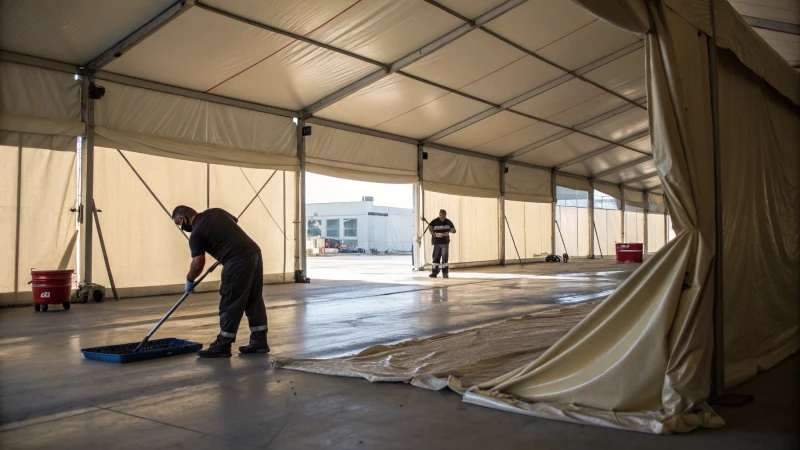
Regular Cleaning Practices
When it comes to maintaining my warehouse tent, I’ve learned that regular cleaning is non-negotiable. Picture this: I once skipped a routine wash because life got busy, and before I knew it, mold had started creeping in. Lesson learned! Now, I use mild soap and water religiously to keep the fabric in tip-top shape, avoiding harsh chemicals that could strip away its protective coatings. Trust me, keeping an eye out for mold or mildew saves a ton of headaches down the road. Learn more about cleaning techniques7.
Routine Inspections
Routine inspections have become my secret weapon in preventing minor issues from snowballing into major problems. It’s kind of like getting a health check-up for your tent. I grab my checklist and scour for tears in the fabric, rust on metal parts, and any loose fittings. It’s amazing how catching these early can save you from a world of trouble.
| Inspection Area | What to Look For |
|---|---|
| Fabric | Tears, discoloration |
| Frame | Rust, loose bolts |
| Anchors | Stability, wear |
Prompt Repairs
I’ve made it a rule to tackle repairs as soon as they crop up. It’s like fixing that tiny chip in your car’s windshield before it spiders across the whole thing. Whether it’s a small tear or a loose bolt, addressing these promptly has spared me costly fixes later on. Keeping a repair kit handy has saved the day more times than I can count.
Proper Storage Solutions
Proper storage is like giving your tent a little vacation when it’s not in use. I’ve learned to disassemble it carefully and store it in a dry, controlled environment to ward off moisture and pests. It’s amazing how much longer my tents last when they’re tucked away safely. Explore storage best practices8 for different types of environments.
Environmental Adaptation
I quickly discovered that local climate plays a big role in tent maintenance. In sunny spots, I apply UV-resistant coatings to shield the fabric. Near the coast? Anti-corrosion treatments are my go-to for protecting metal frames. These little adaptations have worked wonders in extending my tent’s lifespan.
Protective Measures During Use
Whenever my tent is in use, securing it properly is my top priority to protect it from wind or ground movement. I’ve experimented with different anchoring systems9 and found ones that work best for each situation. Ensuring everything is firmly in place has saved me from countless weather-related mishaps.
Regular cleaning prevents tent fabric degradation.True
Cleaning removes dirt and pollutants, protecting the fabric.
Ignoring minor damages saves repair costs.False
Prompt repairs prevent small issues from becoming costly problems.
Why Are Certifications Important When Choosing a Warehouse Tent?
Have you ever been overwhelmed by the choices when it comes to warehouse tents? I sure have, and I’ve discovered that certifications are the key to making a smart decision.
Certifications ensure that a warehouse tent meets international standards for quality, safety, and durability. They help buyers avoid risks associated with non-compliance, guaranteeing reliability and enhancing operational effectiveness.

Ensuring Quality and Safety
I remember the first time I had to choose a warehouse tent. It was a maze of options, each boasting different features. What truly helped me was looking at certifications like ISO and CE. These are not just labels; they represent rigorous testing and adherence to industry standards. I found peace of mind knowing that the manufacturer was committed to quality and safety.
Certifications like ISO and CE provide assurance that a warehouse tent has been manufactured to meet specific quality and safety standards. These certifications indicate rigorous testing and compliance with industry standards10. Manufacturers with these certifications demonstrate their commitment to producing reliable and safe products.
Enhancing Durability
You know that feeling when you buy something and hope it lasts? With certified tents, like those with SGS certifications, you’re not just hoping. These tents are built with high-quality materials designed to withstand harsh conditions. I once invested in a tent that had undergone tests for material strength and resilience. It’s been through a lot but still stands strong.
A certified warehouse tent often boasts enhanced durability due to high-quality materials and construction methods. For instance, tents with SGS certifications have undergone tests for material strength11 and environmental resilience. This means they are more likely to withstand harsh conditions and frequent use without compromising performance.
Compliance with Legal Requirements
Navigating legal requirements can be daunting, but having a certified tent makes it simpler. In some regions, certain certifications are mandatory for using warehouse tents in industrial settings. Trust me, ensuring compliance saves from potential legal headaches and fines, making your business operations smoother.
Depending on the region, certain certifications may be legally required for the use of warehouse tents in industrial or commercial settings. Ensuring your tent is compliant with local regulations can save you from potential legal issues and fines. In regions where certifications are mandatory, having a tent that meets these standards can streamline your business operations12.
| Certification | Description | Benefits |
|---|---|---|
| ISO | International standards for quality management | Ensures consistent quality |
| CE | European conformity marking | Indicates product meets EU safety standards |
| SGS | Testing and certification services | Validates durability and safety |
Competitive Advantage
In the bustling market of warehouse tents, certification can be your secret weapon. When I first started my business, certified products helped build trust with customers. They saw them as a safer investment, which translated into increased sales and loyalty.
In the competitive market of warehouse tents, having certified products can set your business apart from competitors. Customers are more likely to trust certified products, seeing them as a safer investment. This trust can translate into increased sales13 and customer loyalty.
Improved Operational Efficiency
I’ve noticed that certified tents often come with features that boost operational efficiency, like faster setup times or better energy use. These innovations have helped lower my operating costs and increased productivity, making them a smart choice for optimizing storage solutions.
Certified tents often feature innovations that improve operational efficiency, such as faster assembly times or better energy efficiency. These benefits can contribute to lower operating costs and higher productivity, making them an attractive option for businesses looking to optimize their storage solutions14.
Building Trust with Customers
At the heart of it all, certifications build trust. They assure buyers that they’re investing in a safe, efficient, and reliable product. Offering certified tents shows your dedication to quality, resonating with informed buyers who value dependability.
Ultimately, certifications are about building trust with your customers. They assure buyers that the product they are investing in is not only safe but also efficient and reliable. By offering certified tents, you demonstrate a commitment to quality that resonates with informed buyers looking for value and dependability15.
ISO certification ensures consistent quality in warehouse tents.True
ISO standards ensure products meet international quality benchmarks.
CE marking is not related to safety standards for tents.False
CE marking indicates compliance with EU safety and health standards.
Conclusion
A warehouse tent can last 10 to 20 years, depending on material quality, environmental conditions, and maintenance practices. Regular care significantly enhances its durability and reliability.
-
Explore why aluminum frames are preferred for their lightweight and corrosion resistance, contributing to longer tent lifespan. ↩
-
Learn how UV-resistant coatings on fabrics help extend the life of warehouse tents under sun exposure. ↩
-
Understanding UV impact helps in selecting fabrics that resist degradation from sunlight. ↩
-
Learn how chemicals in industrial areas can accelerate material wear. ↩
-
Discover why routine inspections are crucial for maintaining tent integrity. ↩
-
Find effective storage solutions to prevent environmental damage to tents. ↩
-
Discover effective cleaning methods to maintain your warehouse tent’s durability and appearance. ↩
-
Uncover essential tips for storing your warehouse tent safely during off-use periods. ↩
-
Find the most reliable anchoring systems to keep your warehouse tent secure and stable. ↩
-
Learn how ISO and CE certifications ensure quality and safety in warehouse tents. ↩
-
Discover how SGS tests ensure durability and resilience in harsh conditions. ↩
-
Understand the legal obligations for certified tents in industrial settings. ↩
-
Explore how certified products can enhance sales and customer trust. ↩
-
Find out how certified tents contribute to operational efficiency and cost savings. ↩
-
Learn why trust built through certifications enhances product appeal. ↩


